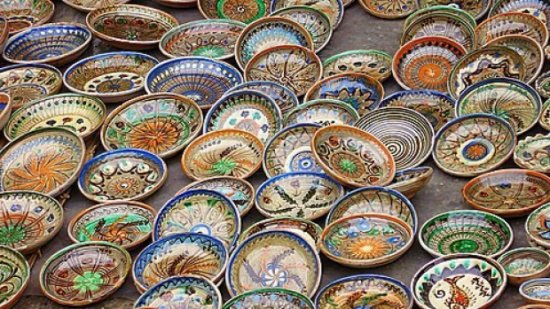 Romania has four cultural objectives included in the intangible heritage of humanity. We speak of particularly valuable traditions. The Male Choral Group is prevalent throughout Romania and Moldova, countries that share the same culture. Carolling is usually related to Advent and the winter holidays. With a profoundly Christian message, carollers spread the news of the birth of Christ. It is a way of preserving social solidarity, because in every village the carollers visit every house. One of the most spectacular forms of The Male Choral Group, which joined UNESCO in 2013, is the “Juni” ritual encountered mainly in mountainous areas, such as the Mărişel in the Apuseni Mountains or the Carpathians surrounding Sibiu. The groups are made up of young men led by a conductor, who carol without rest at all of the houses in the village.
Also in the intangible heritage of humanity are ceramic processing techniques from Horezu. They were included in the UNESCO list in 2012. Horezu Pottery is richly adorned, using archaic techniques, some of them still preserved from the Neolithic times. The pottery is painted with Christian motifs, but they also play with fish, fowl, stars, snakes and trees. There are two specific colours from the Horezu area; red and yellow.
Romania has four cultural objectives included in the intangible heritage of humanity. We speak of particularly valuable traditions. The Male Choral Group is prevalent throughout Romania and Moldova, countries that share the same culture. Carolling is usually related to Advent and the winter holidays. With a profoundly Christian message, carollers spread the news of the birth of Christ. It is a way of preserving social solidarity, because in every village the carollers visit every house. One of the most spectacular forms of The Male Choral Group, which joined UNESCO in 2013, is the “Juni” ritual encountered mainly in mountainous areas, such as the Mărişel in the Apuseni Mountains or the Carpathians surrounding Sibiu. The groups are made up of young men led by a conductor, who carol without rest at all of the houses in the village.
Also in the intangible heritage of humanity are ceramic processing techniques from Horezu. They were included in the UNESCO list in 2012. Horezu Pottery is richly adorned, using archaic techniques, some of them still preserved from the Neolithic times. The pottery is painted with Christian motifs, but they also play with fish, fowl, stars, snakes and trees. There are two specific colours from the Horezu area; red and yellow.Another cultural Romanian objective to be accepted in the UNESCO list is ‘Doina’, a solemn and spontaneous song style. Doina is an essential element of Romanian folklore and, apart from carolling, is the only musical genre spread throughout all of Romania. Doina can express feelings such as love, sadness or regret. Doina was included in the UNESCO list in 2009.
The fourth element found in the intangible heritage of Romanian humanity is the ‘călușul’. This is a Romanian folk dance with a syncopated rhythm and varied movements performed in Wallachia and Moldavia in Whitsuntide week. The ritual has a magical purpose, to protect people and livestock from evil spirits. In some villages, those who practice this ritual, named Căluşari are called to help the sick. The Căluşari joined UNESCO in 2005.






